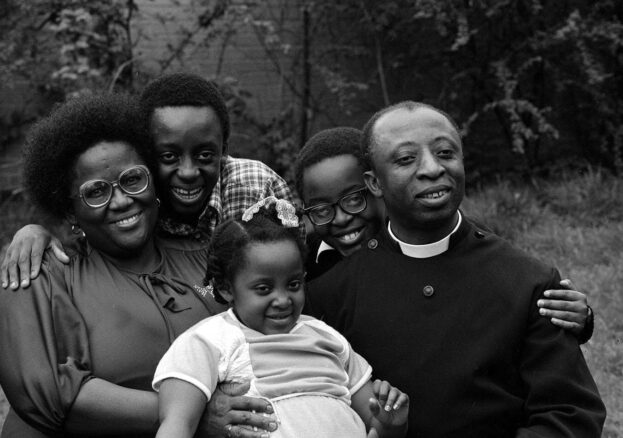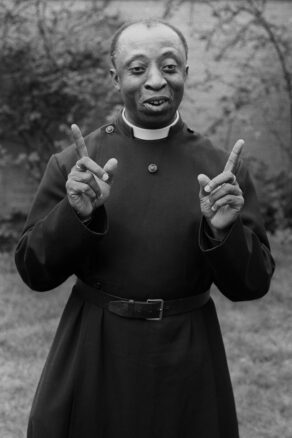
Bishop Wilfred Wood’s life is a powerful testament to the strength of faith, the pursuit of justice, and the indomitable spirit of the Windrush generation. As the first Black bishop in the Church of England, his story is intertwined with the larger historical currents of post-war Britain—a nation grappling with its colonial past and the presence of new communities that had come to rebuild the “mother country.” His journey from Barbados to the heart of the British Anglican establishment is a reflection of both personal resilience and a broader struggle for racial equality, shaped by faith and a commitment to justice.
Wilfred Denniston Wood was born on 15 June 1936 in Barbados, then still a British colony. His childhood was framed by colonial rule and the Anglican faith that dominated the Caribbean islands. His father, a bus concessionaire with his own fleet of buses. and his mother, a shopkeeper, instilled in him the values of hard work, service, and a deep connection to the church. These values would follow him across the Atlantic when he moved to the United Kingdom in 1962, part of a generation of Caribbean migrants who had been invited to Britain to fill labour shortages after World War II.
The Windrush generation, named after the HMT Empire Windrush, which brought the first wave of Caribbean immigrants to Britain in 1948, found themselves navigating a country that both needed their labour and rejected their presence. For many, including Wilfred, it was a jarring confrontation with the harsh realities of racism and exclusion, far removed from the promises of the British Empire. Yet, it was in this crucible of discrimination that his faith deepened and his resolve strengthened.
In later reflections, Bishop Wilfred acknowledged the importance of his upbringing in guiding him through these difficult times: “My faith was the cornerstone of my life. It gave me purpose, and it showed me that service to others was how I could best serve God.” For him, faith was not a passive acceptance of the world’s injustices but an active, forceful engagement with them—something that carried him through his ministry.
The Call to Ministry in a Divided Britain

Arriving in Britain in 1962, Wilfred entered a society deeply divided along racial lines. The country’s immigration policies were tightening, and tensions were rising between the native white population and the growing communities of Black and Asian immigrants. Against this backdrop, he pursued his calling to ministry, seeking to embody the teachings of Christ in a context where racism and inequality were the norm rather than the exception.
He was ordained deacon in Barbados in December 1961 and arrived in the UK on 6 August 1962, and was ordained priest in St Paul’s Cathedral on 21 December of that year, quickly gaining a reputation for his commitment to social justice. His ministry was defined not just by pastoral care but by an insistence that the Church must be a beacon of justice. Bishop Wilfred believed that the Church’s mission extended far beyond its walls; it had to confront the issues of the day, particularly those affecting the most marginalised.
The 1960s and 1970s were turbulent decades in Britain, marked by racial tensions, riots, and the rise of far-right groups like the National Front. Bishop Wilfred was unwavering in his belief that the Church could not remain silent on such matters. He often invoked the words of the Epistle of James: “Faith without works is dead.” For him, it was not enough to preach love and justice from the pulpit; it had to be lived out in action.
His early ministry in London brought him face to face with the struggles of Black Britons—many of whom, like him, had arrived from the Caribbean, hoping for a better life only to be met with hostility and exclusion. Bishop Wilfred’s work with immigrant families, his advocacy for racial equality, and his public denunciation of discrimination earned him a place as a leader within both the Black British community and the Church.
Becoming the First Black Bishop: A Historical Milestone
In 1985, Wilfred Wood was consecrated as the Bishop of Croydon, making him the first Black bishop in the Church of England. His appointment was a significant milestone not only for the Church but for the nation as a whole. It was a symbolic breakthrough, representing a small yet significant crack in the centuries-old racial barriers that had kept Black Britons on the margins of British institutions.
Bishop Wilfred’s elevation to the episcopate did not occur in a vacuum. It came at a time when Britain was wrestling with its own identity—caught between the legacy of empire and the realities of a multicultural society. His appointment was seen as a reflection of these changing times, yet for him, it was not just a personal victory but an opportunity to amplify the voices of the marginalised within the Church.
His leadership as a bishop was characterised by a profound sense of duty to both his faith and his community. In his own words, “Being a bishop is not about wearing robes or sitting in a grand chair. It’s about being a servant of the people, caring for them, and fighting for justice in their lives.” This philosophy guided his work, as he used his position to advocate for those who had been historically excluded from the corridors of power.
A Bishop of Activism and Moral Leadership
Wilfred Wood’s activism was inseparable from his faith. He viewed the teachings of Jesus as a call to confront injustice, wherever it existed. During his time as bishop, he became a prominent voice in the international anti-apartheid movement, speaking out against the South African government’s racist policies and lending his support to global efforts to dismantle apartheid. His stance was not merely symbolic; it was rooted in a deeply held belief that the Church must stand on the side of the oppressed.
In Britain, he continued his work for racial justice, becoming a leading advocate for police reform in the wake of events like the Brixton riots of 1981. These riots, sparked by the police’s use of stop-and-search powers disproportionately against Black Britons, highlighted the fractures in British society. Bishop Wilfred was unafraid to speak truth to power, often reminding the Church of its moral responsibility: “The Church must be a conscience for society. We cannot remain silent in the face of injustice, for silence in such times is a betrayal of our faith.”
His advocacy extended beyond race relations to broader issues of social justice. He was a vocal supporter of initiatives aimed at improving housing, healthcare, and education for the poor and marginalised. His faith compelled him to see these issues as interconnected—the fight for racial justice was part of a larger struggle for the dignity and well-being of all people.
Those who knew Bishop Wilfred Wood recall him as a man of deep compassion and humility, whose leadership was rooted in his personal relationships with the people he served. His pastoral care was not confined to grand gestures; it was expressed in the everyday acts of kindness that defined his ministry. Whether visiting the sick, offering comfort to the grieving, or listening to the concerns of his parishioners, his leadership was marked by empathy and a commitment to the well-being of others.
One parishioner, reflecting on his time under Bishop Wilfred’s leadership, said, “He was more than just a spiritual leader; he was like a father to us. He would sit with you, listen to your troubles, and remind you that God’s love was always with you, even in the darkest times.” His ability to make others feel heard and valued was a testament to his character and his understanding of what it truly meant to lead.
Even as he rose to prominence, Bishop Wilfred remained grounded in his belief that leadership was a form of service. He famously said, “I am but a servant of the Lord. All that I do, I do for His glory, and for the love of His people.” His life was a lesson in the power of servant leadership—a form of leadership that places the needs of others above one’s own ambitions.
Legacy and Ongoing Influence
Bishop Wilfred Wood retired o the 30th September 2002, after a long and impactful career, but his legacy continues to resonate within the Church of England and beyond. His work as a faith-driven advocate for justice has inspired countless others to carry forward his mission of compassion and social change. Even in retirement, the bishop has remained an influential figure, occasionally speaking out on issues of race, justice, and faith.
Bishop Wilfred’s legacy is perhaps best understood in the context of the wider struggles for civil rights and racial justice in Britain. His leadership helped to open doors for greater diversity within the Church of England, and his moral courage in the face of adversity continues to serve as an example for future generations. As he once said, “The Church must be at the forefront of the struggle for justice. We are called to love our neighbour, and that love must be expressed through action—through standing up for those who are oppressed and working for a world where everyone is treated with dignity and respect.”
Bishop Wilfred Wood’s life and ministry are a testament to the enduring power of faith, justice, and love in action. His journey from the Caribbean to the episcopate in Britain is a reflection of both personal resilience and the larger historical forces that have shaped modern Britain. Through his work, he has taught us that faith is not a passive belief but an active force for good—a call to serve, to uplift, and to stand against injustice in all its forms. His legacy continues to inspire those who seek to live out their faith in a world that still grapples with inequality, teaching us all the power of a life dedicated to justice, compassion, and service.
